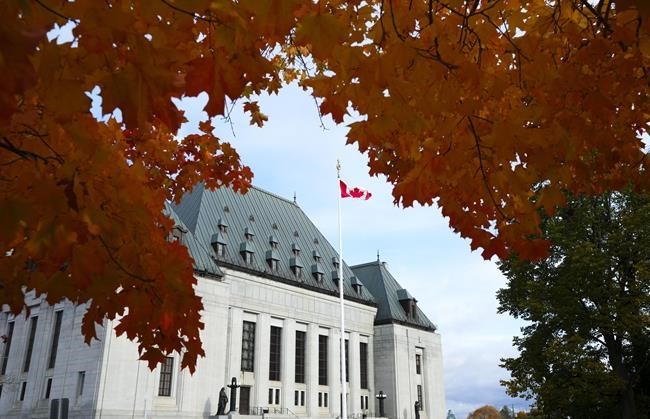OTTAWA — The Supreme Court of Canada has upheld the constitutionality of provisions that prevent an offender from avoiding jail by serving their sentence in the community, finding no evidence they had a disproportionate effect on Indigenous people.
In a 5-4 decision Friday, the top court overturned an Ontario Court of Appeal ruling that found the Criminal Code provisions violated the Charter of Rights and Freedoms.
The decision comes in the case of Cheyenne Sharma, a young Indigenous woman who pleaded guilty to importing two kilograms of cocaine in exchange for $20,000 from her boyfriend, a task she carried out to avoid eviction for herself and her daughter.
Sharma successfully challenged a Criminal Code provision that called for a two-year mandatory minimum sentence.
However, a judge rejected her constitutional challenge of another provision that disallowed a conditional sentence for offences that can entail a stiff prison term.
Ultimately, she received a term of 18 months in custody, less one month for pre-sentence detention and time on bail.
Sharma contested the decision and the Ontario Court of Appeal ruled that two Criminal Code sections relevant to her case violated the Charter, saying they discriminated against Indigenous people on the basis of race and were overbroad in relation to their purpose.
Under the Criminal Code sections in question, a conditional sentence could not be imposed when an accused person was convicted of an offence prosecuted by way of indictment with a maximum term of 14 years or life, or an offence prosecuted by indictment involving the import, export, trafficking or production of drugs, where the maximum penalty is 10 years in prison.
"The provisions deny Ms. Sharma a benefit in a manner that has the effect of reinforcing, perpetuating and exacerbating her disadvantage as an Aboriginal person,'' Justice Kathryn Feldman wrote for a majority of the Court of Appeal in 2020.
Sharma was 20 years old, with no criminal record, when she brought the cocaine into Canada.
The Court of Appeal noted the woman of Ojibwa ancestry, a member of the Saugeen First Nation, had a particularly difficult upbringing and has struggled with depression and anxiety.
As a child, Sharma and her family moved in with her grandmother after her father was arrested and deported to Trinidad.
Sharma was raped by two men while walking home at age 13. She was engaged in sex work by age 15. At 17, she became a single mother.
Her grandmother attended two residential schools as a child, prompting the sentencing judge to describe Sharma as "an intergenerational survivor of the government's residential school effort to eradicate the cultural heritage of her people."
The Court of Appeal found a conditional sentence of 24 months less a day should have been imposed.
Conditional sentences were introduced in the mid-1990s, allowing a judge to have the offender serve time in the community, including through a form of house arrest with strict conditions attached. The measures were aimed at encouraging principles of restorative justice and reducing reliance on time behind bars.
A conditional sentence could be imposed if the offence did not carry a minimum sentence, the sentence handed down was less than two years, and serving the sentence in the community did not pose a danger.
An additional provision instructed sentencing judges to consider alternatives to prison for all offenders, with particular attention to the circumstances of Indigenous people.
The Safe Streets and Communities Act, introduced by the Conservative government of Stephen Harper, was passed by Parliament in 2012, eliminating the availability of a conditional sentence in various circumstances, including those in Sharma's case.
In its decision Friday, a majority of the Supreme Court said Sharma did not show that the Criminal Code provisions in question created or contributed to a disproportionate effect on Indigenous offenders, relative to non-Indigenous ones, as she must do to demonstrate a violation of the Charter guarantee of equality under the law.
"The sentencing judge did not accept that the impugned provisions disproportionately impact Indigenous offenders, for good reason," justices Russell Brown and Malcolm Rowe wrote on behalf of the majority.
"While the Court of Appeal overturned the sentencing judge's conclusion, it failed to identify any evidence supporting Ms. Sharma’s argument that the impugned provisions created or contributed to a disproportionate impact on Indigenous offenders."
The court also found the provisions are not arbitrary or overbroad, and therefore do not breach the Charter requirement that a law must respect the principles of fundamental justice if interfering with life, liberty or security of the person.
The British Columbia Civil Liberties Association, which intervened in the case, said it was disheartened that the Supreme Court had reverted to a "technical and impoverished view" the Charter's equality guarantee by placing "an undue burden on Indigenous defendants to prove what has already been recognized time and time again: the lasting legacy of colonialism in the criminal justice system has directly resulted in the overrepresentation of Indigenous people in prisons."
This report by The Canadian Press was first published Nov. 4, 2022.
Jim Bronskill, The Canadian Press



